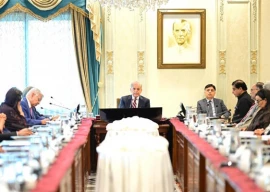
The backlog at the Punjab Services Tribunals (PST) has soared to over 8,000 cases as the bozdy has remained non-functional for five months due to a legal dispute over the validity of its members’ appointments.
On March 23, the day the Supreme Court declared the appointment of the tribunal members illegal and directed the Punjab government to appoint new members, there were 5,380 cases pending at the PST, which deals with matters related to civil servants. The backlog has now grown to over 8,000, officials at the PST said.
Meanwhile, four members of the tribunal have refused to give up their posts. Muhammad Tariq Ayub, Abdul Majeed Bhatti, Kareem Bakhsh Abid and Shafique Hussain Bukhari turn up at their offices in chauffer-driven vehicles every morning and stay there till the end of office hours. They are reported to hold a meeting with the PST chairman every day from 11am to 12 noon. However, they are not hearing any cases due to doubts about their eligibility.
A former government officer in grade 16 who was dismissed told The Express Tribune that he had filed a case at the tribunal one year ago, but there had been no progress on it. He said that he had been forced to borrow money from relatives and friends and then sell his wife’s jewellery in order to survive. He said that he was certain that he would be quickly reinstated if his case came up, as colleagues who had been dismissed on similar grounds had been restored by the tribunal.
The tribunal had six members, but Najam Saeed resigned in May while Rai Ijaz Zaigham was transferred several months ago. PST Chairman Justice (retired) Saeed Akhtar continues to hear cases, though under the law he too is ineligible.
In his resignation letter, Saeed said that he was stepping down as member, some two months after the court’s decision, because he feared being charged with contempt of court if he continued in his post.
The Punjab government, in compliance with the SC’s instructions to pass legislation on qualifications required for appointment to the tribunal, passed the Punjab Tribunals (Amendment) Act 2013, it has not yet attempted to remove the incumbent members.
According to the new law, a tribunal member must be a district judge, a civil servant of the rank of secretary or equivalent who has performed quasi-judicial functions or functions relating to service matters, or a person qualified for appointment as a High Court judge. Appointments must be made in consultation with the chief justice of the Lahore High Court. The chairman and members are selected for three-year terms and cannot be reappointed. The chairman must be qualified to be a High Court judge and below the age of 65.
Justice (r) Akhtar, who retired as an LHC judge on May 2, 2001, at the age of 62, is well above the age limit. The four incumbent members do not qualify either, as they are all retired civil servants, sources in the tribunal said.
Implementation and Coordination Secretary Ali Tahir told The Express Tribune that the act also called for the formation of a committee to review the cases of the incumbent chairman and members. The committee, he said, had completed its deliberations and decided that “most” of the members are ineligible. He did not say which members were ineligible. He said once the law was gazetted, the ineligible members would be removed and fresh appointments would be made.
Published in The Express Tribune, August 21st, 2013.







1722521491-0/Ryan-Reynolds-TJ-Miller-0002-(1)1722521491-0-270x192.webp)







COMMENTS
Comments are moderated and generally will be posted if they are on-topic and not abusive.
For more information, please see our Comments FAQ